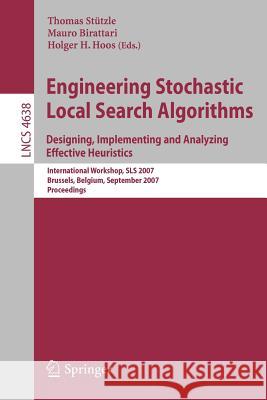Engineering Stochastic Local Search Algorithms: Designing, Implementing and Analyzing Effective Heuristics: International Workshop, SLS 2007 Brussels, » książka
Engineering Stochastic Local Search Algorithms: Designing, Implementing and Analyzing Effective Heuristics: International Workshop, SLS 2007 Brussels,
ISBN-13: 9783540744450 / Angielski / Miękka / 2007 / 238 str.
Engineering Stochastic Local Search Algorithms: Designing, Implementing and Analyzing Effective Heuristics: International Workshop, SLS 2007 Brussels,
ISBN-13: 9783540744450 / Angielski / Miękka / 2007 / 238 str.
(netto: 191,66 VAT: 5%)
Najniższa cena z 30 dni: 192,74
ok. 16-18 dni roboczych.
Darmowa dostawa!
Stochastic local search (SLS) algorithms enjoy great popularity as powerful and versatile tools for tackling computationally hard decision and optimization pr- lems from many areas of computer science, operations research, and engineering. To a large degree, this popularity is based on the conceptual simplicity of many SLS methods and on their excellent performance on a wide gamut of problems, ranging from rather abstract problems of high academic interest to the very s- ci?c problems encountered in many real-world applications. SLS methods range from quite simple construction procedures and iterative improvement algorithms to more complex general-purpose schemes, also widely known as metaheuristics, such as ant colony optimization, evolutionary computation, iterated local search, memetic algorithms, simulated annealing, tabu search and variable neighborhood search. Historically, the development of e?ective SLS algorithms has been guided to a large extent by experience and intuition, and overall resembled more an art than a science. However, in recent years it has become evident that at the core of this development task there is a highly complex engineering process, which combines various aspects of algorithm design with empirical analysis techniques and problem-speci?c background, and which relies heavily on knowledge from a number of disciplines and areas, including computer science, operations research, arti?cial intelligence, and statistics. This development process needs to be - sisted by a sound methodology that addresses the issues arising in the various phases of algorithm design, implementation, tuning, and experimental eval- tion.











